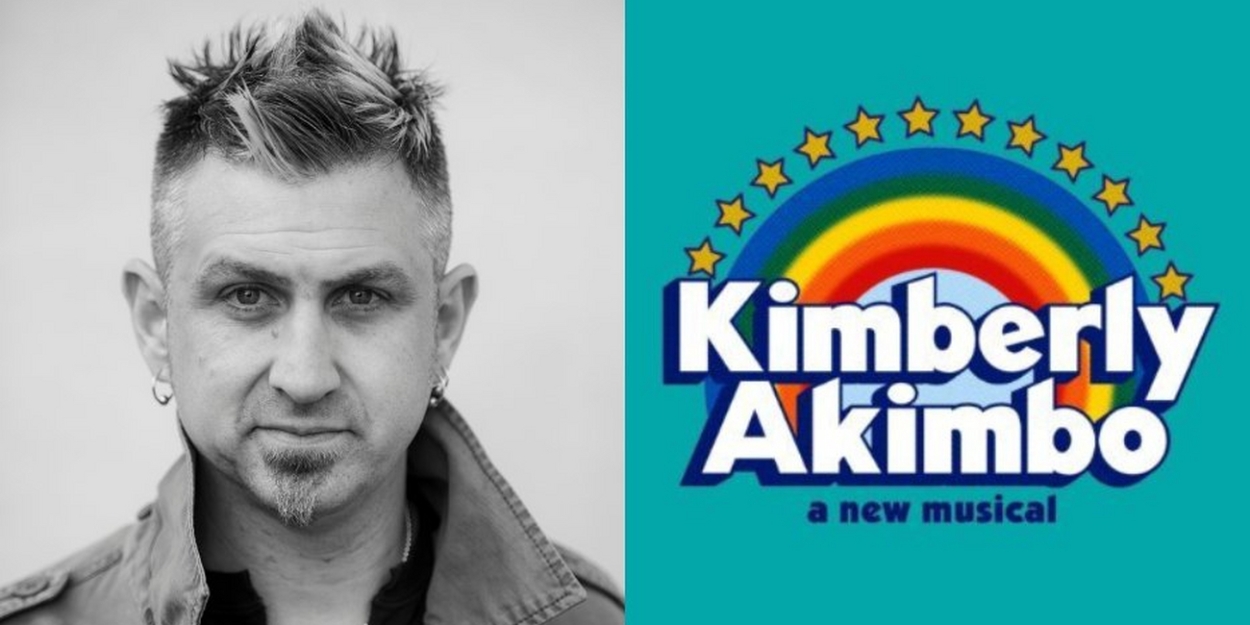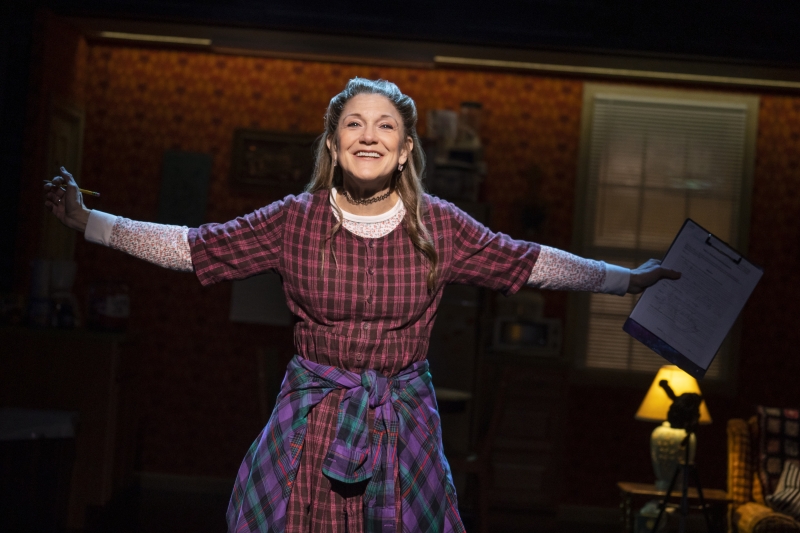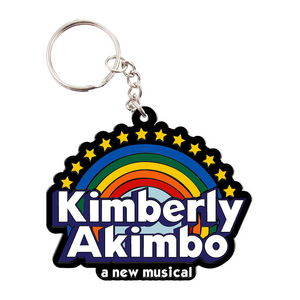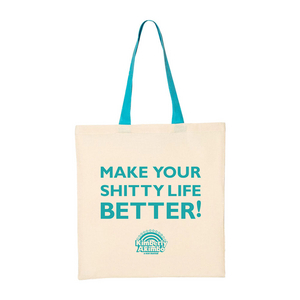Interview: How KIMBERLY AKIMBO Orchestrator John Clancy Went From Rock Drummer To Broadway Pro
John Clancy is best known for his Tony-nominated work on Mean Girls, Fun Home, Shrek the Musical, and more!

This season, the hilarious and heartfelt new musical Kimberly Akimbo is leaving Broadway audiences in tears in more ways than one. The show tells the story of a bright New Jersey teen with a peculiar medical disorder that causes her to physically age prematurely and the casually criminal family that loves and often disappoints her.
Behind the score of the show is Tony Award-winning composer Jeanine Tesori and the show's Pulitzer Prize-winning creator, David Lindsay-Abaire, who have taken the characters and story of Abaire's acclaimed 2000 play to new heights with a score that is as infectious as it is moving.
Bringing all of the necessary colors to the material is Tony-nominated orchestrator John Clancy who uses his encyclopedic knowledge of music to bring out the show's New Jersey spirit while underscoring the material's tremendous emotional resonance.
Best known for his work on popular shows like the recent revival of 1776, Mean Girls, The Prom, Fun Home and Tuck Everlasting, John's road to Kimberly was as unconventional as they come going from career rock musician to pit player to Tony-nominated Broadway orchestrator over the last two decades!
We had the chance to sit down with John to learn about his ongoing collaboration with Jeanine Tesori, his rock-y road to Broadway, how he built Kimberly's signature Jersey sound, and more! Get to know more about John in our interview below.

This is now your fourth collaboration with Jeanine Tesori after working on Fun Home, Shrek the Musical, and Caroline, or Change together. What is that collaboration like and how does it differ from other composers you work with?
Every composer is completely different but Jeanine is an exception in a million ways because she can literally write music. Some composers can't write music or read music. They do everything by ear. They play their song into a recorder with a piano or a guitar and that's the end of it. Jeanine makes no demos ever. So she'll write a piano part that she spends time on. Then I look at that piano part, knowing that there's a lot of care in the notes she decided to put down on the page because she'll wait and wait and wait to put the notes on the page. So once she does, I know she's put thought and care into that. So I try to use as many of the ideas that are on the page as possible from her.
We go back 20 years now, I was the drummer on Caroline, or Change and I helped create the percussion and drum books there, that's how our relationship started. So we started at a place where we were creating something new and from there I've done film scoring work with her, I've done all kinds of random stuff with her in addition to Shrek and Fun Home where I was orchestrating. So, I just have a very particular relationship with her. All the other composers I work with are just totally, wildly different. Any job where you're in a collaborative situation, you have to read people. What are they? Where are they? What are they sensitive about and what are they loose about? That's all I ever do. I just try to figure out the next composer. Some of them want to be real hands on and have specific meetings about the sounds. Others wanna just say, "I have no idea what to do with it, I trust you. Just go," you know? It's wildly different.
In Kimberly Akimbo there are so many musical colors in the score. In the opening number, we're hearing representation for the show's setting which is New Jersey. So there's like Bruce Springsteen and the E Street Band baked in there, but other moments feel like very legit musical theatre. It's very hard to pin down in terms of genre. What were some of the influences for the sound of the show?
I had keep the tenor sax in the beginning of the show because that is the sound of the Springsteen. You can't have Springsteen without Clarence Clemons. It also sounds like Bryan Adams' "Summer of '69", and he's, of course, doing Springsteen in that song. The Killers had a whole album that actually sounds like their take on Springsteen, except they're using things like sequencers in the background. So I tried to bring The Killers into the background of that piece as well. So I just wanted it to sound like a modern version of Springsteen, who I love.
The opening song is more of a piece of music than a song. It starts as a song and then it gets into like Queen orchestral stuff. Whenever it got sort of anthem rock-y and opera-like, I went to Queen instantly because they did it the best, but for anything that's orchestral, I just go totally orchestral and drop the rock band out completely. I ditch everything and go all orchestral just because I just don't ever want it to sound quasi. But after the opening number, the show is open season to as to what kind of style Jeanine might do. The next thing in the show is, "Hello Baby", which is musical theatre chamber music. So there's no correlation to any pop music at all, and there's nothing we can use from it. So then I go into that world and I'm looking at things like Samuel Barber. I love all these other styles and I go with the sounds and artists that inspire me. I'm going for the authenticity of each moment. That's my goal anyway. I don't know if it's working, but that's my goal.
When I spoke with David Lindsay-Abaire, he discussed the difference between working on these smaller shows versus the high expectation spectacles like Shrek, Mean Girls, etc. Having worked on things of various sizes, what has the experience been like returning to a smaller form?
This was the first thing I wrote coming out of the pandemic. I wrote the first chart for the song, "Our Disease", and the the smallness of it reminded me of Fun Home, but it was bigger and it was more complicated and I just got my juice back doing it. It just meant a lot to me because we were all so mentally screwed up from the pandemic and this score brought me back. It was so beautifully written and it was complex and simple at the same time and just things that Jeanine does that really no one does, you know? She and I are very close and we have a family relationship between each other where distance doesn't matter, so when we reconnect, we just start where we left off. So it brought everything back sort of full circle, and so I'm just so happy that it transcended Off-Broadway so more people can hear it and see it.
How did you get into the business of orchestrating? Were you a theatre kid? What's your musical background?
I was a drummer from when I was 12. I played in bands all through high school and college. I had a band director in high school that changed my life who exposed me to all kinds of incredible composers. I grew up in the 80s so otherwise I was listening to Iron Maiden, Metallica, The Police, Genesis and Pink Floyd and stuff. But that guy changed my life. I didn't want to go to college and play drums, so I went to Hartt School of Music as a composition major. They accepted me based on the songs I had been writing. I hadn't written for real orchestra instruments yet, but I guess they could see something in me. So, I wrote for everything in there. When I got out, I just went to New York and I started playing in bands and I toured a bunch.
So, how did you make your way to Broadway?
Kim Grisgsby called me to play for a show at the Public in 2003 called Radiant Baby that George C. Wolfe directed. Billy Porter was in it and we became close friends in there. So I started playing in Billy's band for his soul music and stuff. I was playing with Billy at Joe's Pub and Jeanine was there. So then I get a call asking if I can come to The Public Theater because Jeanine was working on this show there. So I brought my hand drum down and I jammed with her at an upright piano in the basement. The next thing you know, she's asking me to do the show. I was supposed to go on the road with some band or whatever. I was still obsessed with being in bands. But that fell through so I took the gig, and I made Caroline, or Change with her.
Wow.
This is crazy stuff. It really is. Then Buryl Red, who was Jeanine's mentor and co-orchestrated Caroline, or Change, pushed me through a lot of stuff. He got into what I was doing and he's the one who told Jeanine to have me write the chart to get the job of Shrek. When she got the gig, she said, "I want you to do this, but I need to pair you up with somebody who's experienced." So she paired me up with Danny Troob who did all the Disney stuff and then that changed everything, you know?
Your story is very unique. I've never heard of anyone who, like, fell into Broadway.
I did. I really did.
So as primarily a rock musician, when it comes to the more legitimate musical theatre scores, how do you compose for instruments you might not play?
First of all, you're constantly learning about them. You're always getting better because you're learning like from the last thing you wrote. That's your craft. You're just building up your well of stuff. So I keep doing that. I'm just also am a huge fan of the players. Kids will call me and ask how I know how to write guitar parts like that. Well, first of all, tell me your top 10 favorite guitar players. If you don't know that, then you don't love the instrument, and if you don't love the instrument, you can't write for it. So you take the way those guys played, and then you're writing it into the next thing you write. So, I don't play the cello, but I've learned over the years. I'm not a genius. I just sit home and I just pretend. I airplay instruments and stuff. I really do. I just do it in the air and I figure it out. Most of it is just coming from like, a bunch of passion and junk. Then I just bring in the technical side that I've learned over time.
What's the best part of your job?
I get emails sometimes from a player doing one of my scores in Kansas or something or I'll get a Facebook message that says like, "I just love this cello part." If you ask my wife, that's all I ever care about. All I care about is if the musicians love their part ecause literally I spend the time at home thinking, "If I was playing the trombone, what would I want to play?" When the cellist who did Fun Home in Cleveland told me it was one of the most celloistic books she'd ever played, I cried because that's...I don't play the cello! (laughs) The woman who played the harp in Chicago for The Notebook wrote me this text and I actually screenshotted the text because it was so crazy to me that she wrote me this beautiful text about her part. I couldn't even stomach it. It was just crazy to hear that on the instrument. I don't play, you know? I try so hard to do that stuff.
John Clancy has been a New York/touring drummer, music director, and orchestrator for the last 20 years. He played with acts like Corey Glover, Randy Newman, Carly Simon, Kasim Sulton, Danielia Cotton, Billy Porter, Alexa Joel, BIV Gospel Choir Band and Constantine Maroulis (American Idol). As a music director he worked with: Blood Orange (aka Dev Hynes), Solange Knowles, Chrissie Amphlette of Divinyls, and two Kidz Bop Live! National Tours. John orchestrated numerous theatrical shows such as: Fun Home, Tuck Everlasting, Shrek the Musical, The Fortress of Solitude, and Jasper in Deadland and wrote new dance arrangements for the new version of CATS. He also performed and worked on the development of Spider-man: Turn Off The Dark with Bono and Edge of U2. Other Broadway playing credits: Caroline, or Change, Spring Awakening, Tarzan, Brooklyn, and Grease.



 Kimberly Akimbo Unisex Point of View Hoodie
Kimberly Akimbo Unisex Point of View Hoodie Kimberly Akimbo Logo Keychain
Kimberly Akimbo Logo Keychain Kimberly Akimbo Life Tote
Kimberly Akimbo Life Tote Kimberly Akimbo Name Beanie
Kimberly Akimbo Name Beanie